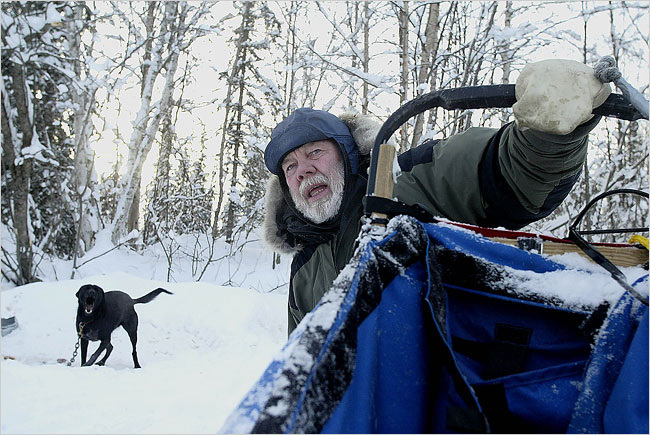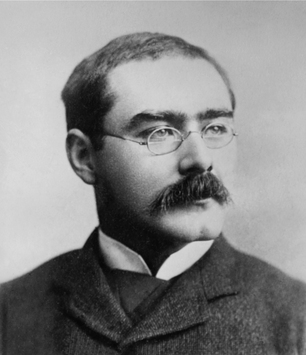|
with Angela Harris Gary Paulsen and The Iditarod  Author Gary Paulsen Author Gary Paulsen This week's lesson was all about American author, Gary Paulsen, the Iditarod dog sled race, and a wonderful prose poem by Paulsen called "Dogteam." First, we started with our weekly three-minute journal question/free-write. The topic was "cold." Students were asked to describe a time they were so cold, it hurt. Could they feel the cold air tingling in their lungs? Did their hands hurt from the cold? Were their fingers stiff? Did their nose sting from the wind? They were to be as descriptive as possible in preparation for a later exercise! Back to Gary... After a quick history lesson on the Iditarod, we met Gary Paulsen (author of Hatchet and Brian's Winter) who is considered by many to be a modern day Jack London. London inspired much of Paulsen's work, and in reading through his bio, we soon found out why. Although he was never a dedicated student, Paulsen developed a passion for reading at an early age. After a librarian gave him a book to read — along with his own library card — he was hooked. He began spending hours alone in the basement of his apartment building, reading one book after another. Running away from home at the age of 14 and traveling with a carnival, Paulsen acquired a taste for adventure. A youthful summer of rigorous chores on a farm; jobs as an engineer, construction worker, ranch hand, truck driver, and sailor; and two rounds of the 1,180-mile Alaskan dog sled race, the Iditarod; have provided ample material from which he creates his powerful stories. Living in the remote Minnesota woods, Paulsen eventually turned to the sport of dog racing, and entered the 1983 Iditarod. In 1985, after running the Iditarod for the second time, he suffered an attack of angina and was forced to give up his dogs. "I started to focus on writing the same energies and efforts that I was using with dogs. So we're talking 18-, 19-, 20-hour days completely committed to work. Totally, viciously, obsessively committed to work, the way I'd run dogs....I still work that way, completely, all the time. I just work...I'm just this way...." Sound familiar? Yes, we agreed--a lot like Jack London. I then read "Dogteam" by Paulsen. The story is an account of the night runs that he used to make with the dogs that he was training. "Dogteam" is an example of prose poetry. This type of poetry is meant to be read aloud; has rhythms, rhyme, assonance (repetition of similar vowel sounds), and consonance (repetition of similar consonant sounds) present in many other forms of poetry; vivid imagery and emotional effect; there is a continuous sequence of sentences without line breaks. After discussing the meaning of some of the more descriptive, if not obscure, phrases, we learned about Sentence Fluency trait. Gary Paulsen gives us a chilling, powerful example of the Sentence Fluency trait. He alternates very quick and concise sentences and phrases with lengthier, very descriptive, almost rambling sentences. We are trained to recognize and create sentences that look correct, with capital letters, subjects, predicates, commas in all the right places. But the trait of Sentence Fluency teaches us that every sentence doesn’t need to “look correct” in order to fit. Prose Poems Using Sentence Fluency Trait  We then practiced writing our own prose poems using Sentence Fluency trait. Remember that free-write on "cold?" Using some of our free-write, or starting from scratch, we set out to create some prose poetry. I rolled two die four times to create four sentences. Whatever was rolled was the number of words each sentence could contain. We were hoping for a nice, random mix of long and short sentences, but the odds were a bit against us. Still--the students wrote some beautiful prose, and I'm happy to share it with you here. These are based on die roll of FOUR/SEVEN/FIVE/TWELVE. I want to add that they had to write these in about five minutes. Enjoy! My fingers are burning. The heat is spreading throughout my body. But it isn’t quite right. Something is different--wrong--because this feeling is not hot, but cold. -- A.R. My fingers were numb. My lips, cheeks, and nose were burning. My toes felt like icicles. Every step I took I felt myself growing more and more tired. -- K.I. Winter wind is alive. It lives within the very first snow. Forever unchanging, never the same the open forest waits for the wind, stretching to the watercolored sky. -- C.B. Rudyard Kipling
Comments are closed.
|
Categories
All
Archives
May 2016
|



 RSS Feed
RSS Feed